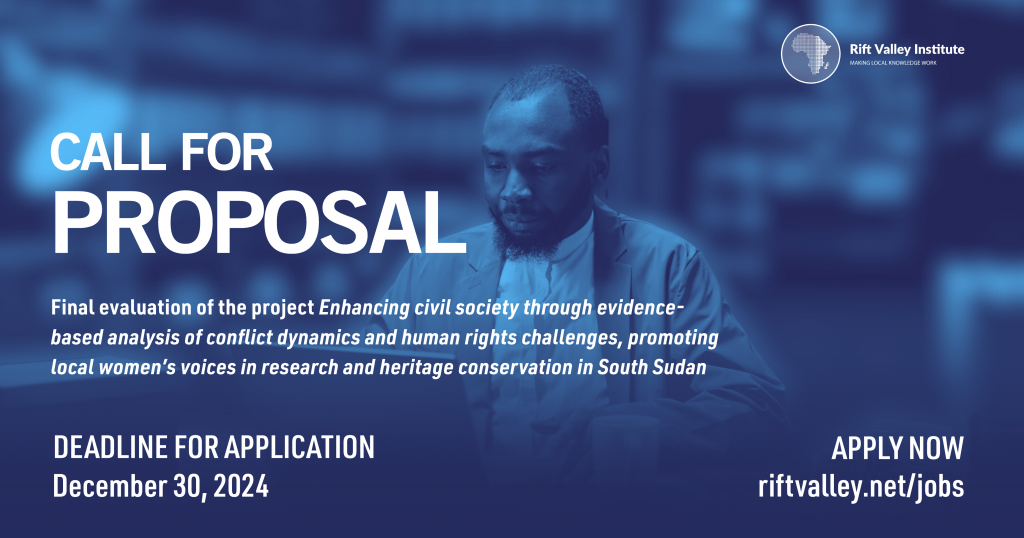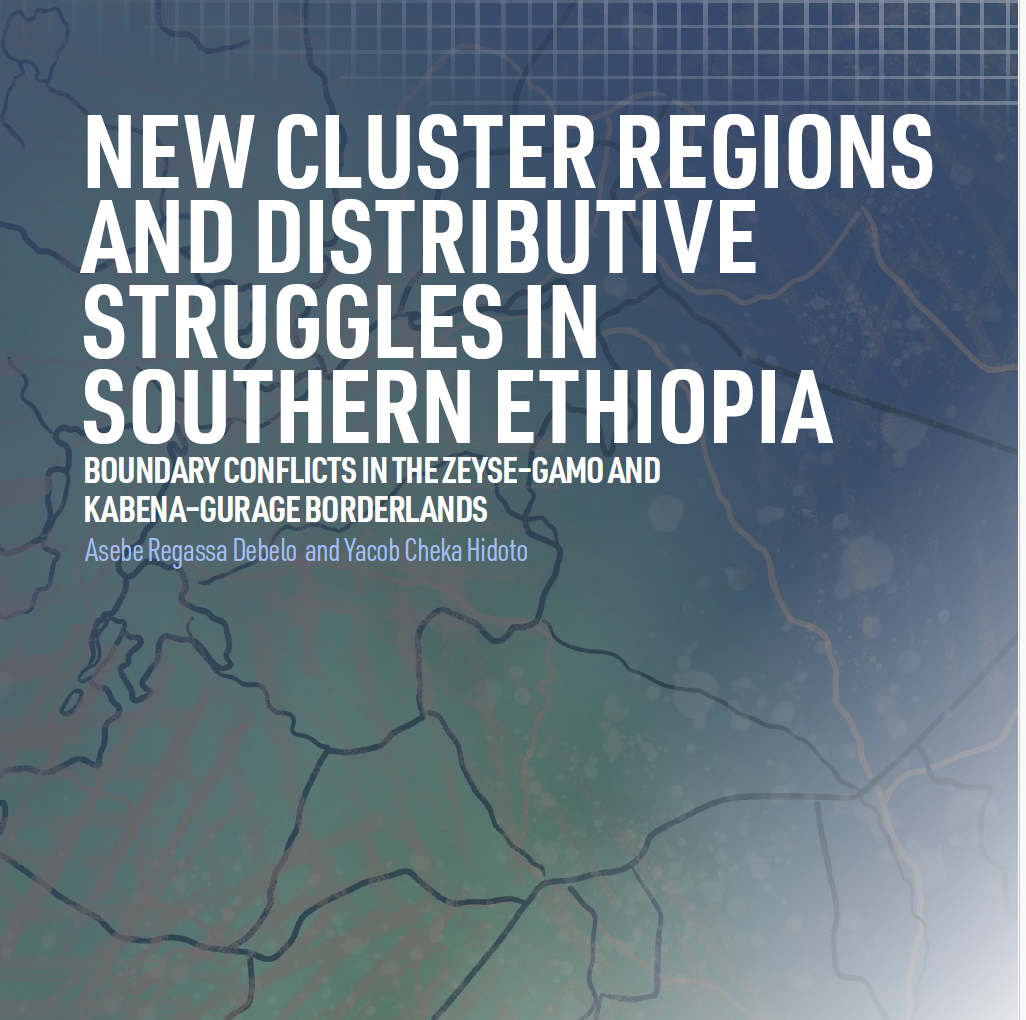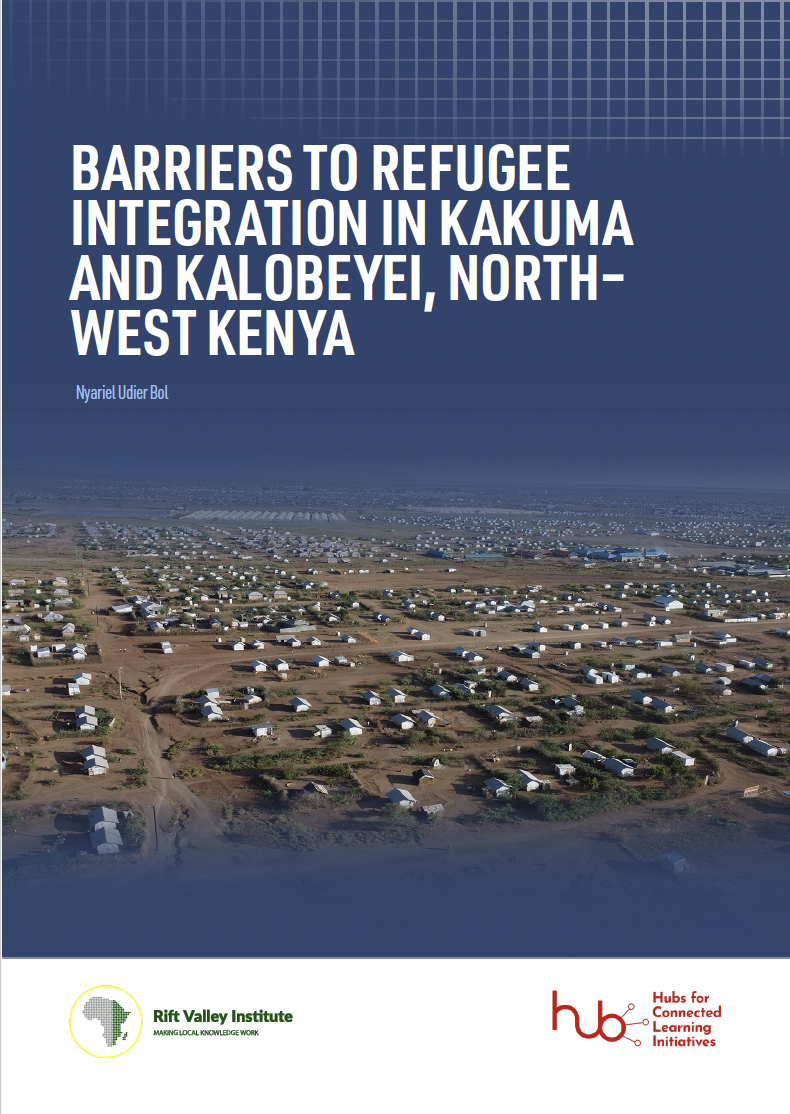
About the Rift Valley Institute
The Rift Valley Institute (RVI) is an independent, non-profit organization, founded in Sudan in 2001, that works in Eastern and Central Africa to advance useful knowledge of the region and its diverse communities, bringing a better understanding of local realities to bear on social and political action. RVI works with institutions in the region to develop and implement long-term programmes that combine action-oriented research with education and public information.
The call for proposal
RVI seeks to contract consultancy services to design and implement the end of project evaluation for the EU-funded project, ‘Enhancing civil society through evidence-based analysis of conflict dynamics and human rights challenges, promoting local women’s voices in research and heritage conservation in South Sudan’, implemented between 2020 and 2024.
The project has sought to promote local women’s voices in research development and heritage preservation through capacity building and training in evidence-based research and analysis. It was developed in response to the need to engage more women in research and bring their voices and issues to the fore, recognizing that institutions of higher learning in South Sudan have few women researchers due to historical inequalities in education and other sectors. This has resulted in a lack of meaningful evidence-based, structured policy engagement on gender issues specifically, and developmental issues more broadly. The project aimed, among other things, to promote the engagement of women as independent experts and development actors in policy development in the country.
Purpose of the evaluation
The end of project evaluation will assess, among other things, how the project was implemented, the extent to which the project achieved its goal and objectives and outcomes, the efficiency and effectiveness of project interventions, and whether the impacts of the project are likely to be sustainable.
Scope of the evaluation
The evaluation will cover all components of the project and the entire duration of its implementation from 2020 to 2024, assessing all project activities, namely: research, research dissemination, dialogue, and training and capacity building of local researchers. The evaluation will assess the impact of the project in its entirety and in terms of each of its elements with reference to the objectives set out in the project document and against OECD evaluation criteria. It will involve interactions with RVI partners and beneficiaries, particularly members of the South Sudan Women’s Research Network (SSWRN) and their mentors, staff of South Sudan National Archives, and RVI staff.
Evaluation questions
The evaluation questions will seek to assess the project objectives, implementation framework, and impacts against the OECD evaluation criteria to establish relevance, effectiveness, efficiency, impact, sustainability and coherence. In this connection, the evaluation will seek answers to the following, questions:
- Relevance – how well does the project align with the priorities and needs of the target beneficiaries and stakeholders, and to what extent did the project objectives remain valid over the implementation period?
- Effectiveness – to what extent has the project achieved its stated objectives and outcomes; and what factors contributed to or hindered its success?
- Efficiency – how economically were resources (time, financial, and human) used to achieve the results, and could the same results have been achieved more cost-effectively?
- Impact – what are the positive and negative, primary and secondary long-term effects of the project, and how, if at all, has it contributed to systemic changes?
- Sustainability – what is the likelihood the benefits of the project will continue after project completion, and what mechanisms are in place to ensure sustainability of its impact?
- Coherence – how compatible were project activities with other interventions in the country and within the sector, and to what extent was the project aligned with wider national and international policy frameworks and imperatives?
Methodology
The evaluator will be expected to develop a creative, participatory methodology tailored to the South Sudan context and the long-term nature of the project under evaluation in collaboration with the RVI South Sudan staff. It is expected that data collection and analysis tools will include, but not be limited to:
- Desk review of literature, policies, and key project documents and reports;
- Engagement with project managers, researchers, mentors, facilitators, trainers, beneficiaries, partners and other stakeholders through key informant interviews and focus group discussions;
- Stakeholders review and validation of the draft evaluation report
The list of key informants to be engaged in the process of evaluation will be agreed between the evaluator and RVI, and will include women researchers who are the main beneficiaries of the project; staff and students of Catholic University of South Sudan staff and Students in both Juba and Wau; staff of the Ministry of Culture, Museums and National Heritage in Juba and at state level; South Sudanese and international academics and researchers who mentored the women researchers; and project staff at RVI.
Evaluation tasks and deliverables
In implementing the evaluation, the evaluator will perform the following specific tasks:
- Develop an inception plan that presents the evaluator’s understanding of the assignment, articulates a methodology for execution of the assignment, and proposes a work plan. The inception plan will also propose a structure for the evaluation report.
- Conduct a desk review of relevant project documents and reports, as well as policies and literature to identify key issues for the evaluation and inform the design of data collection tools
- Develop data collection tools for key informant interviews and focus group discussions;
- Conduct key informant interviews and focus group discussions to answer the evaluation questions;
- Prepare a draft report that analyses the data generated through key informant interviews, focus group discussions and review of documents, and answers the evaluation questions
- Revise the draft report on the basis of feedback and comments received from RVI and other stakeholders to produce a final evaluation report.
The evaluator shall develop and submit the following deliverables:
- Inception report of not more than 5 pages;
- Data collection tools for key informant interviews and focus group discussions;
- Draft report
- Final report
The evaluation report shall not exceed 30 pages, and will include an executive summary. It will be accompanied by annexes, including data collection tools and a list of key informants and focus groups.
Evaluation timeline
The evaluation shall be undertaken over a period of 16 days, distributed as follows:
- Contracting, consultations with RVI staff, desk review of literature, policies and project reports, and development of Inception Report and data collection tools – 2 days
- Fieldwork – key informant interviews and focus group discussions – 10 days
- Development of draft evaluation report – 3 days
- Development of final report – 1 day
The evaluation shall be undertaken between 6th January 2025 and 10th February 2025. The final report shall be submitted not later than 5 pm EAT on 10th February 2025.
Consultant profile
This assignment is open to qualified individuals, who, among other qualifications, shall be expected to demonstrate:
- Strong understanding of the South Sudan context generally, and gender dimension of research in South Sudan specifically;
- Proven experience of conducting evaluations of long term development projects in conflict and fragile affected contexts with skills in creative methods of data collection, validation and analysis;
- Experience of evaluating EU-funded projects
- Fluency in English with skills in writing of consultancy reports
- Practical knowledge of Arabic will be an added advantage.
Application procedure
Interested persons should submit a technical and financial proposal to Michael.Odhiambo@gmail.com, with copies to Alex.Miskin@riftvalley.net and Benjamin.Deng@riftvalley.net to be received not later than 5 pm EAT on 30th December 2024


